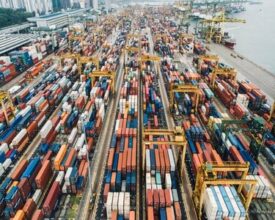Who is the Minister of Transportation?
Incumbent Nigeria’s Minister of Transportation is Sa’Idu A. Alkali. He was redeployed from the Ministry of Interior to Transportation four days after portfolios were assigned to the ministerial nominees.
Mr Adegboyega Oyetola, the former Governor of Osun State was initially for the Transportation but will now manage the Ministry of Marine and Blue Economy in Bola Tinubu’s 45-member cabinet whose portfolios were announced on Wednesday, August 16, 2023.
Significance of Ministry of Transportation
Transportation is one of the the keys to microeconomic and agribusiness development of a country. A country that fails to develop its transportation network may either force local production out of the market or lead to high cost of goods and services.
A dedicated ministry that takes care of the development of this infrastructure is the Federal Ministry of Transportation.
The ministry is responsible for coordinating and management of the transport system across Nigeria.
Before Oyetola, the ministry was managed by Mr. Rotimi Amaechi, a former governor of Rivers State, and he was assisted by Gbemisola Saraki, a former member of the National Assembly.
Many times, the now independent Ministry of Aviation was put under Transportation even during the first term of Muhammadu Buhari, but he separated it while constituting his second-term cabinet.
5 Key Responsibilities of Nigeria’s Federal Ministry of Transportation
- To provide direction for transportation policy and control.
- To supervise and monitor and ensure that transportation policies are implemented.
- To formulate relevant transportation laws for the general of Nigerians.
- To carry out the auditing of management of all the eight parastatal under its management.
- To liaise with the ministry of aviation and other ministries because it can achieve success in isolation.
Agencies:
With 12 departments in the ministry of transportation, assisted by four units, the ministry has eight agencies that help it to achieve commendable results in its mandates.
Note: At least, six out of the 8 agencies below will most likely go with the new ministry that will manage the economic potential of Nigeria in the ocean and waters.
| Transportation Parastatal | Year of establishment |
| Nigerian Institute of Transport Technology | 1986 |
| Nigerian Railway Corporation | 1955 |
Functions of the agencies of Federal Ministry of Transportation
Nigerian Institute of Transport Technology
To research transport management and development geared towards building transport system in Nigeria
Nigerian Railway Corporation
To carry out the carriage of passengers and freight in a cost-effective manner
Departments in Nigeria’s Federal Ministry of Transportation
- Human Resources Management
- Procurement
- Special Duties
- General Services
- Maritime Services
- Engineering Services
- Finance and Accounts
- Rail Transport Services
- Maritime Safety & Security
- Transport Planning & Coordination
- Reform Coordination & Service Improvement
- Road Transport & Mass Transit Administration
It also has internal audit, legal services, survey, and Public-Private Partnership units
Contact details:
Federal Ministry of Transportation, Bukar Dipcharima House, Central Business District, FCT, Abuja, Nigeria.
- Instagram.com: @transportchroniclesng
- Official website: transportation.gov.ng
Assessment:
We must commend the government through the ministry of transportation for embarking on bringing the rail transport system back to life.
In terms of protecting its rail lines, the government and the ministry have failed woefully.
Severally, its coaches were attacked by Boko Haram terrorist remnants (mildly called bandits) in Kaduna state. The latest was the bombing of his track, but the ministry continues to either disregard such attacks or lie about it.
Another problem with the ministry is its plans to construct a standard gauge for the Kano-Maradi rail line while an old narrow gauge was planned for other parts of Nigeria.
At the moment the cost of transporting goods with Nigeria is 5.3 times higher than in the United States of America, according to the 2021 World Bank Global Facility to Decarbonise Transport report.
Again, the Nigerians Railway Corporation (NRC) which was founded to carry out the carriage of passengers and freight in a cost-effective manner, is now costlier to use than road transport.
In terms of security, it isn’t safe, in terms of standard, it’s poor because we’ve seen one of the acclaimed new coaches break down in the middle of a thick forest, thereby exposing passengers to attacks. NRC needs to step up its game.
We want to see the Transportation Ministry build its local infrastructure than develop the “economy” of the Niger Republic that could not compete favourably with the economy of the Southeast geopolitical zone.


